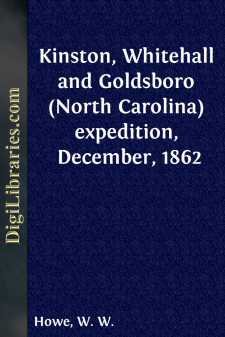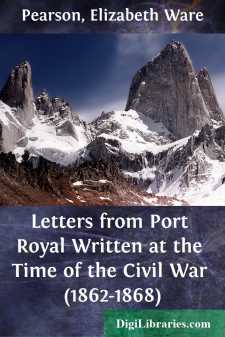History
- Africa 30
- Americas (North Central South West Indies) 50
- Ancient 68
- Asia 58
- Australia & New Zealand 8
- Canada 41
- Caribbean & West Indies 1
- Civilization 20
- Eastern Europe 12
- Europe 310
- Expeditions & Discoveries 60
- General 77
- Historical Geography 1
- Jewish 9
- Latin America 3
- Medieval 8
- Middle East 13
- Military 248
- Revolutionary 8
- Study & Teaching 5
- United States
- Western Europe 56
- World 13
United States Books
Sort by:
by:
Alfred Burnett
The author of the following sketches, letters, etc., has been known to us for lo, these many years. We have always found him "a fellow of infinite jest," and one who, "though troubles assailed," always looked upon the bright side of life, leaving its reverse to those who could not behold the silver lining to the darkling clouds of their moral horizon. We could fill a good-sized volume...
more...
by:
Isaac Allen
If there is one subject which, above all others, may be regarded as of national interest at the present time, it is the subject of Slavery. Wherever we go, north or south, east or west, at the fireside, in the factory, the rail-car or the steamboat, in the state legislatures or the national Congress, this "ghost that will not down" obtrudes itself. The strife has involved press, pulpit, and...
more...
by:
Allen Johnson
CHAPTER I. PRESIDENT JEFFERSON'S COURT The rumble of President John Adams's coach had hardly died away in the distance on the morning of March 4,1801, when Mr. Thomas Jefferson entered the breakfast room of Conrad's boarding house on Capitol Hill, where he had been living in bachelor's quarters during his Vice-Presidency. He took his usual seat at the lower end of the table among...
more...
by:
Lucinda Lee Orr
"Wilderness" Residence of John Grymes, Esq., who married Miss Fitzhugh, of Eagle's Nest. One of this family was Gen. Robert Lee's grandmother. I hear you say, "The Wilderness! where in the world is that, Lucy?" It is the name of this place. I can't say I was much struck with the situation of the House; but they are as kind, good People as I ever saw. Sept. 17.To-day is...
more...
INTRODUCTION In the year 1864 Mr. Henry C. Murphy, then corresponding secretary of the Long Island Historical Society, had the good fortune to find in an old book-store in Amsterdam a manuscript whose bearings upon the history of the middle group of American colonies made it, when translated and made accessible as a publication in the Memoirs of the Long Island Historical Society, an historical...
more...
by:
Various
A DECLARATION. When, in the course of human events, it becomes necessary for one people to dissolve the political bands which have connected them with another, and to assume among the powers of the earth the separate and equal station to which the laws of nature and of nature's God entitle them, a decent respect for the opinions of mankind requires that they should declare the causes which impel...
more...
by:
W. W. Howe
Major General J. G. Foster commenced a movement of his army from New Berne this morning. At 3 p. m. we came upon the enemy's pickets (near our present camping ground), when three prisoners were taken by the advance guard of the Third New York Cavalry. In attempting to press forward we found the road densely blockaded by felled trees; this blockade extended for several hundred yards, being situated...
more...
INTRODUCTION. KNICKERBOCKER'S HISTORY OF NEW YORK is the book, published in December, 1809, with which Washington living, at the age of twenty-six, first won wide credit and influence. Walter Scott wrote to an American friend, who sent him the second edition—— "I beg you to accept my best thanks for the uncommon degree of entertainment which I have received from the most excellently jocose...
more...
A SHACK ON THE PRAIRIE At sunset we came up out of the draw to the crest of the ridge. Perched on the high seat of the old spring wagon, we looked into a desolate land which reached to the horizon on every side. Prairie which had lain untouched since the Creation save for buffalo and roving bands of Indians, its brown grass scorched and crackling from the sun. No trees to break the endless monotony or...
more...
INTRODUCTION With Commodore Dupont's capture, on November 7, 1861, of two earth forts which the rebels had recently thrown up at Hilton Head and Bay Point, South Carolina, the Sea Island region became Union territory. The planters and their families having fled precipitately, the United States Government found itself in possession of almost everything that had been theirs, the two chief items...
more...











